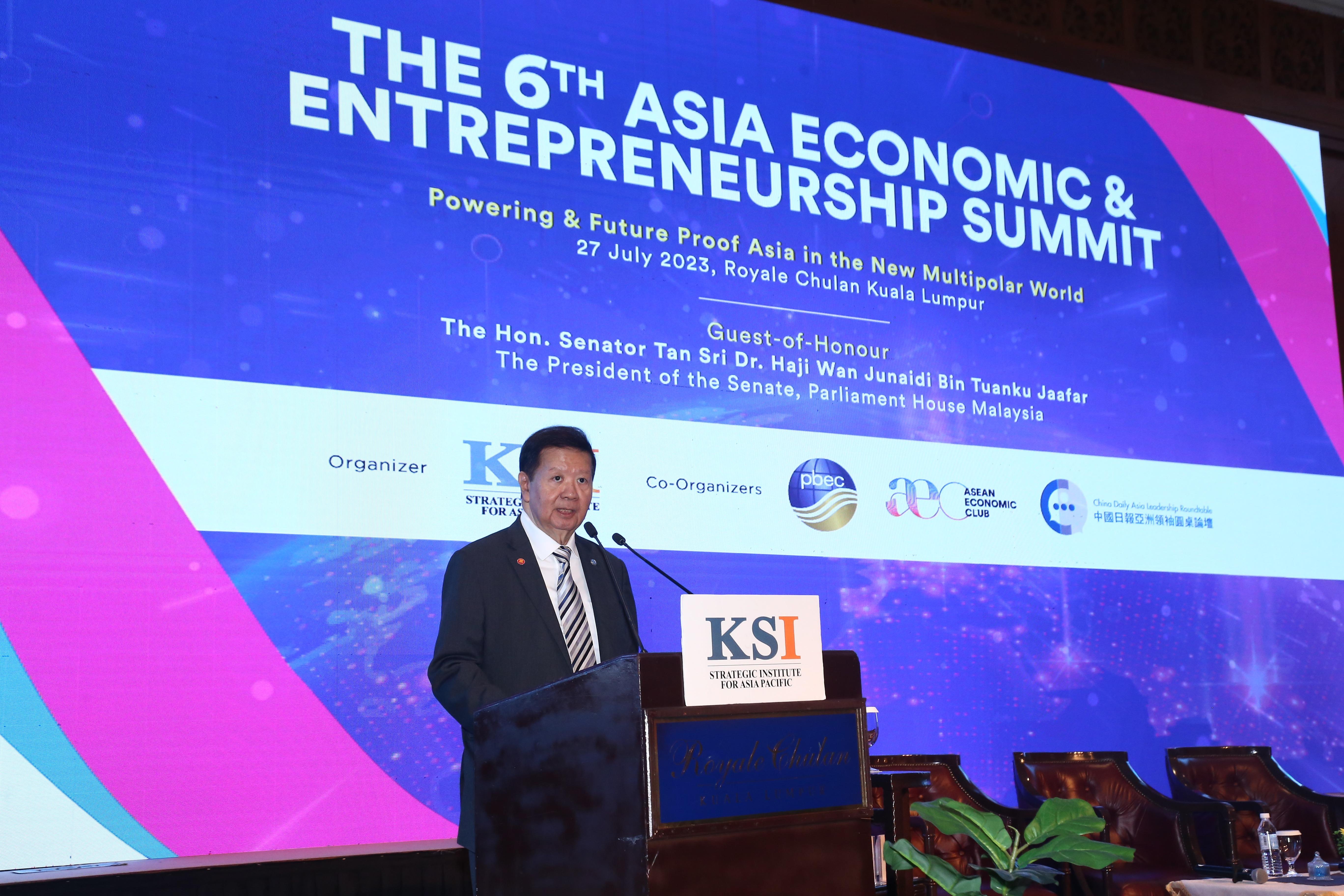 Michael Yeoh, president of the KSI Strategic Institute for Asia Pacific, delivers a welcome speech at the 6th Asia Economic & Entrepreneurship Summit in Kuala Lumpur on July 27, 2023. (PROVIDED TO CHINA DAILY)
Michael Yeoh, president of the KSI Strategic Institute for Asia Pacific, delivers a welcome speech at the 6th Asia Economic & Entrepreneurship Summit in Kuala Lumpur on July 27, 2023. (PROVIDED TO CHINA DAILY)
As multilateralism is becoming increasingly important, the world will see a major shift toward the CIA – China, India and the Association of Southeast Asian Nations, a summit heard on July 27.
It is “a very strategic change that will see greater collaboration and partnership between China, India and ASEAN,” said Michael Yeoh, president of Malaysia-based think tank KSI Strategic Institute for Asia Pacific, in his welcome speech at the 6th Asia Economic and Entrepreneurship Summit in Kuala Lumpur.
The one-day summit was held in a hybrid format under the theme “Powering and Future Proof Asia in the New Multipolar World”, with the aim of reflecting the region’s need for a great reset amid growing geopolitical tensions and geostrategic challenges
Proposing Malaysia as the fulcrum of the CIA, Yeoh, who is also chairman of the ASEAN Economic Club, said the country can take advantage of the opportunities that will arise from the cooperation with the three major economies.
The one-day summit was held in a hybrid format under the theme “Powering and Future Proof Asia in the New Multipolar World”, with the aim of reflecting the region’s need for a great reset amid growing geopolitical tensions and geostrategic challenges. It was organized by the KSI Strategic Institute for Asia Pacific, together with the Pacific Basin Economic Council, the ASEAN Economic Club and China Daily Asia Pacific.
ALSO READ: ADB: China's economy bolstering growth in Asia-Pacific
Yeoh said regional countries need to put more emphasis on the ecology, technology and transformation as they are the drivers of future trade.
“Trade and investment, and infrastructure development will boost the economies of our region,” said Yeoh, adding that he hopes to see further acceleration in implementing the Regional Comprehensive Economic Partnership.
The RCEP free trade deal comprises 15 Asia-Pacific countries including 10 ASEAN member states and their five trading partners – China, Japan, South Korea, Australia and New Zealand. It entered into effect on Jan 1, 2022.
In the first half of this year, China's imports and exports with the other 14 RCEP members totalled 6.1 trillion yuan ($855 billion), up 1.5 percent year-on-year, contributing more than 20 percent to China's foreign trade growth, according to the General Administration of Customs.
ALSO READ: Modi: India aims to become developed nation in 25 years
“In this era of uncertainty, Asia needs to adapt, embrace change, and strive for an economically prosperous and environmentally responsible future,” said Qu Yingpu, publisher and editor-in-chief of China Daily, who joined the summit via video link.
Noting Asia is facing many challenges, Qu said entrepreneurs and business leaders must play a transformative role to address challenges in the development path toward a green and sustainable future.
A prosperous Asia can ultimately serve as a catalyst for global progress, said Qu, who noted that Chinese President Xi Jinping had said that “the biggest strength comes from cooperation, and the most effective way is through solidarity”.
China’s flow into ASEAN and the Middle East and the rise of the Indian economy give way to lots of opportunities for surrounding economies, said Michael Walsh, CEO of Pacific Basin Economic Council.
READ MORE: ASEAN leaders urge cooperation to rebuild economies
Speaking of Hong Kong, where the business association is based in, Walsh said the special administrative region has maintained its position as an international finance center, and the “one country, two systems” principle can still create more benefits and allows the city to better facilitate initial public offerings.


